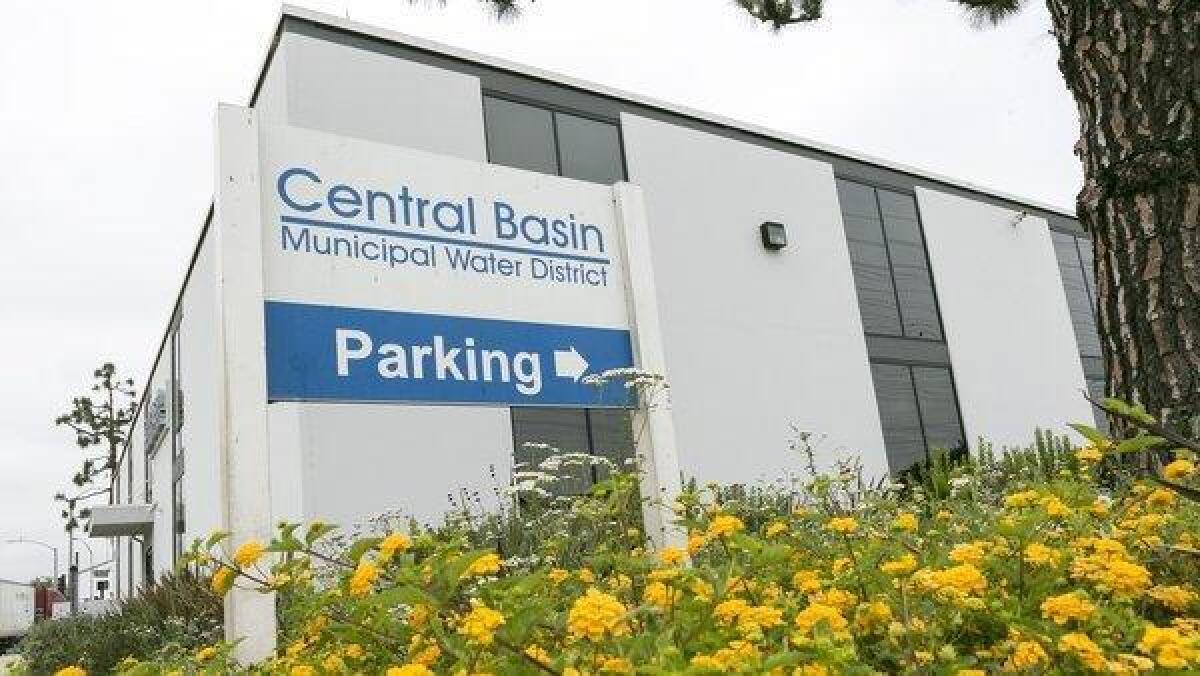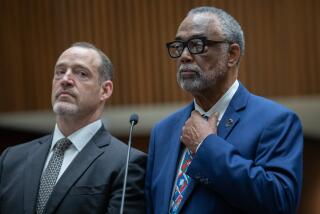He worked at a water district for just seven days. But it ended up costing $1.5 million

Seven work days into Ron Beilke’s job at the Central Basin Municipal Water District ended up costing $1.5 million
Seven work days into Ron Beilke’s job at the Central Basin Municipal Water District, the agency’s governing board placed an item on its next meeting agenda. It called for firing him from his $98,000-a-year job as assistant to the general manager.
Two hours later, Beilke crashed headfirst into a wall on the second floor of the district’s headquarters in the City of Commerce. One employee later said she watched Beilke fly across the frame of her door, arms stretched out, like Superman.
Beilke, who was taken away by paramedics in a neck brace, later collected workers’ compensation and sued for wrongful termination. Central Basin commissioned a report that quoted employees who questioned whether Beilke’s fall had been deliberate.
But by the time Central Basin settled with him nearly four years later, the agency racked up costs of nearly $1.5 million.
“Maybe it was just divine intervention,” Beilke said in an interview with The Times about the timing of the fall. “Maybe someone was looking out for me without killing me.”
In the wake of the costly incident, some have questioned why Beilke was hired in the first place. A former Pico Rivera mayor, Beilke had been convicted of political misconduct.
He’s not alone in getting a second chance. In southeast Los Angeles County, cities such as Bell, Vernon and Cudahy have been plagued by recurring political scandals that have received national attention and resulted in promises of reform. But some officials caught up in scandal manage to get back into government.
In 2015 Huntington Park hired a company managed by ex-Bell Gardens Councilman Mario Beltran, despite criminal convictions for filing a false police report and misusing campaign cash — and having no experience in transit.
The company, Metro Transit Services, charged a 45% higher rate than the city’s previous contractor, and billings for service ultimately tripled. The city also leased new buses to the company at far below market rate, an arrangement the then-finance director called “completely inappropriate.”
There’s also Curtis Fresch, who got a $300,000-a-year job in Vernon and then a $175,000 a year job in the City of Industry despite a record that included a no contest felony plea in 1997 to willfully making a false state tax return, according to court records.
Despite the notoriety from his stint in Vernon — which was the target of a disincorporation effort by California lawmakers — Fresch was hired by the City of Industry as its utilities director. He resigned from his position in December 2016 after The Times inquired about his employment at City Hall.
These small government agencies get little public scrutiny, and experts say that has allowed such conduct to continue.
“These sorts of sweetheart positions for people who have proven they cannot be trusted happen more on the local level,” said Jessica Levinson, an L.A. city ethics commissioner and Loyola Law School professor. “The appointer will think they can get away with it.”
The Central Basin Municipal Water District had been mired in years of scandal when it hired Beilke.
The agency has been caught up in so many legal claims that they were a factor in the agency losing its insurance coverage. In one case, the district’s insurance paid $670,000 to a woman who alleged that a board director sexually assaulted her.
A 2015 audit found that the agency was plagued by budget deficits and credit downgrades. A former general manager and board member were fined after steering contract work to a company that gave them almost $8,000 worth of gifts. It hired unqualified staff and illegally created a secret $2.75-million trust fund, the audit said.
In Beilke’s view, he was brought in to the district as a reformer. He said water district leaders viewed him as a digger who could help them root out corruption in the politically troubled agency. Beilke had previously worked for a rival water agency, and while there had provided tips about problems at Central Basin.
“I had friends on the board there,” he said. “They looked at me as the guy who exposed Central Basin.”
But Beilke had his own problems. In 2010, prosecutors accused him of voting while mayor for a roadway project that benefited his Weinerschnitzel in Pico Rivera.
While he faced misdemeanor charges for the project votes and felony charges related to allegations of accepting illegal gifts, another local water agency — the Water Replenishment District of Southern California — kept him employed with a six-figure compensation package and even promoted him, he said.
Beilke was eventually convicted of misdemeanor conflict of interest charges, which he dismissed as “petty to say the least.”
He was brought in to Central Basin to be assistant to the general manager, Chuck Fuentes. Six years earlier, Beilke had helped hire Fuentes as city manager of Pico Rivera.
But by then, a new board had been elected to run the district, and it became clear those new officials could undo the decision made by the old board.
Then the incident occurred.

On Jan. 8, 2013, an employee, Margarita Gomez, said she provided a draft agenda to Fuentes that included a proposal to fire Beilke, according to Central Basin’s December 2013 investigative report. She told the investigator that Beilke was in the office.
About an hour or so later, at around 3 p.m., Gomez told the investigator that she heard “footsteps in the hallway outside her open office door” that sounded “heavy” and “indicated they were being made in a ‘running manner.’”
In the report Gomez said she looked out and saw Beilke flying across the frame of her doorway “at full speed diving into the wall.”
She described his position as face down with his hands and arms “fully extended” and legs “fully stretched out,” his body about half a foot in the air before crashing into the wall with a “loud bang,” according to the report.
“Oh no,” the report quoted Gomez thinking to herself as she saw Beilke flying. “Is he really doing what I think he’s doing?”
Another employee, Al Plimpton, was described in the report as an “ear-witness” who heard similar sounds of running steps and then a bang.
Employees rushed to the scene. Beilke was found face down, moaning.
The report said that in his workers’ compensation claim Beilke said he “fainted at work.” A forensic analysis of the hole left on a wall outside Gomez’s office was done that included collecting a section of drywall.
“Located within the circular impression were numerous skin fragments and a strand of hair,” the report read. The forensic scientist concluded that the hole was consistent with an impact made by a “human head.”
Beilke denied the accounts of the employees and contended they had lied about him.
He denied knowing about the proposal to fire him at the time of his fall. Beilke said he suffered serious neck injuries and that he would have to be “insane” to purposely dive into the drywall.
Almost exactly two years after the fall, in December 2015, Beilke’s hiring by Central Basin was part of a state audit that criticized Central Basin for hiring Beilke in closed session, in a non-competitive process, and for creating an “unnecessary” position.
In late 2016, Central Basin settled a wrongful termination lawsuit filed by Beilke alleging he was fired for investigating water district corruption. The agency agreed to pay him $425,000 — on top of the more than $300,000 paid out in workers’ compensation.
Central Basin also spent about $710,000 for legal work defending against Beilke’s lawsuit, as well as for the cost of the investigation, according to an agency spokesman.
Water agency spokesman Joseph Legaspi declined to comment on the investigative report but said the district has since implemented safeguards to “ensure that we hire qualified talent,” including a prohibition on the board making personnel decisions about staff other than the general manager.
“The District has made significant progress in addressing past issues,” Legaspi wrote in an email.
The state Legislature has also stepped in and passed bills aimed at reforming Central Basin.
By last fall, Beilke had found work at a company that operates a solar farm in El Mirage in the Mojave Desert. It’s run by a former Central Basin executive.
His job involved finding local governments willing to do business.
More to Read
Start your day right
Sign up for Essential California for news, features and recommendations from the L.A. Times and beyond in your inbox six days a week.
You may occasionally receive promotional content from the Los Angeles Times.







